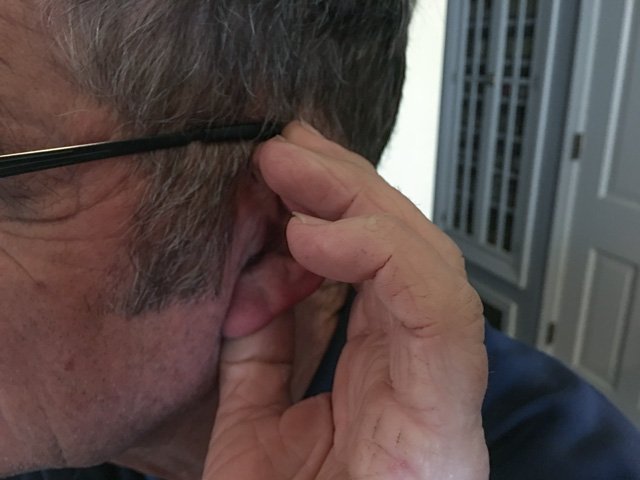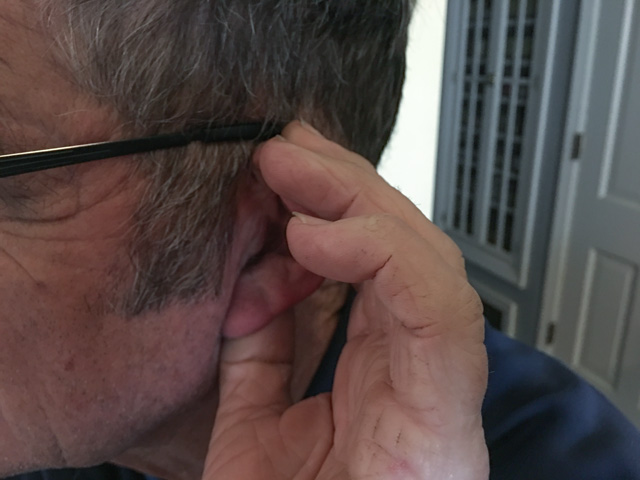Production Blog
Speak Up About Your Hearing Loss
Being a journalist requires listening and I got an earful recently from a family friend. He lamented that his family often becomes annoyed when he misses pieces of conversation or asks for them to be repeated.
I'd already noticed he wore hearing aids and I'm sympathetic because I also have hearing loss, tinnitus (ringing in ear) and hyperacusis (pain associated with certain noises).
Although the fellow in this case wasn't a farmer, he's had a career around loud equipment. I turned my best ear toward him and leaned in a bit to tell him how deeply I understand his situation.
"Can you hear me when I speak to you?" I asked. We were in a pub setting and others were speaking around us.
"Yes," he exclaimed. Those who suffer with hearing loss often tell me I'm easy to understand. There's a reason for that -- I've conditioned myself to face others when I converse and to speak more deliberately. Speaking louder isn't necessarily the key, it's more about body position and speaking directly.
Sadly, my friend proceeded to tell me that he often feels left out or befuddled in group settings. "Rather than ask again what was said, I give up. I see the looks ... people think I'm dumb or losing it," he said.
Perhaps because hearing loss is often associated with aging, it comes with a stigma. The reality is, hearing loss is a disability -- albeit a mostly invisible one. Since it doesn't stick out like a broken bone or some other physical ailment, it requires that you, the person with the hearing loss, constantly advocate for yourself.
I've yet to feel marginalized when I've confessed my hearing loss and asked, for example, to step to a quieter place to converse. But I still find myself muddling through garbled conversations -- kicking myself internally that I didn't speak up!
COVID-19 has complicated our lives in many ways, but especially for the hearing impaired. Many of us had no idea how much we watch lips to understand others until those lips were covered by masks. Muffled words from behind masks and plexiglass add to the mumbled mess.
P[L1] D[0x0] M[300x250] OOP[F] ADUNIT[] T[]
With all that in mind, here are a few tips that may help you navigate the coming holidays, family events, parties and winter farm meetings filling the schedule.
-- Let others know you have hearing difficulties and simply tell them your needs. They can only help if they know.
-- Be patient with yourself and realistic. Group conversations at large gatherings can be frustrating. You may need to pull individuals aside to a quiet spot for more intimate discussions.
-- Some locations make hearing more difficult. Taller ceilings or metal buildings can be tough, for example.
-- Conversations often happen while people are moving or doing other things. Again, explain the situation and how important it is to stop and have face-to-face dialogue.
-- In a dinner setting, ask to be seated in the center of the table or near the person you most want to converse with.
-- If blaring background music is interfering, ask if it can be lowered. In the same light, candlelight can make it hard to lip read if that's how you fill conversational gaps.
-- Hearing fatigue is a real thing. It may be necessary to remove yourself from the din of prolonged gatherings to let the brain rest and regroup.
-- Back of the room seating may be great if you want to sleep through a meeting, but not if you want to pick up important details. Sit where you can hear and not just where it is convenient to make an escape.
-- Small recorders or phone recorders can be helpful for review purposes if it is important to capture the last word during a meeting. Transcription apps such as Otter.ai can help convert those meeting notes to written word.
I've found comfort and lots of practical ideas from reading a free blog written by Shari Eberts, a New Yorker who advocates for those with hearing difficulties through her website: Living With Hearing Loss (www.livingwithhearingloss.com).
When I wrote about the topic several years ago, Ebert told me:
"Communication practices apply to the person with the loss and those who live and work around them."
Trust me, you will have to speak up about your hearing loss over and over. Loved ones don't always "hear" or absorb it. Doctors, receptionists, the clerk at the implement dealership -- all may need a kind reminder that what they say matters to you. Put that way, I'll bet they listen.
**
Editor's Note:
Parts of this article were originally published as a blog in November 2019:
Pamela Smith can be reached at pamela.smith@dtn.com
Follow her on Twitter @PamSmithDTN
(c) Copyright 2021 DTN, LLC. All rights reserved.






Comments
To comment, please Log In or Join our Community .